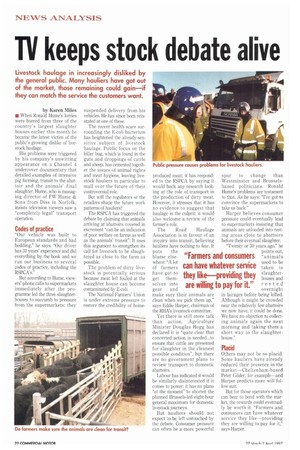Pi keeps stock debate alive
Page 24

If you've noticed an error in this article please click here to report it so we can fix it.
Livestock haulage in increasingly disliked by the general public. Many hauliers have got out of the market, those remaining could gain—if they can match the service the customers want.
by Karen Miles • When Ronald Hume's lorries were barred from three of the country's largest slaughter houses earlier this month he became the latest victim of the public's growing dislike of livestock haulage.
His problems were triggered by his company's unwitting appearance on a Channel 4 undercover documentary that detailed examples of intensive pig farming, transit to the abattoir and the animals' final slaughter. Hume, who is managing director of FIAT Hume & Sons from Diss in Norfolk, insists television viewers saw a "completely legal" transport operation.
Codes of practice
''Our vehicle was built to European standards and had bedding," he says. "Our driver has 31 years' experience and did everything by the book and we run our business to several codes of practice, including the RSPCA's."
But according to Hume, viewers' phone calls to supermarkets immediately after the programme led the three slaughterhouses to succumb to pressure from the supermarkets: they suspended delivery from his vehicles. He has since been reinstated at one of these.
The recent health scare surrounding the E-coli bacterium has heightened the already-sensitive subject of livestock haulage. Public focus on the killer bug, which is found in the guts and droppings of cattle and sheep, has cemented together the issues of animal rights and meat hygiene, leaving livestock hauliers in particular to mull over the future of their controversial role.
But will the regulators or the retailers shape the future work patterns of hauliers?
The RSPCA has triggered the debate by claiming that animals arriving at abattoirs covered in excrement "can be an indication of poor welfare on farms as well as the animals' transit". It uses this argument to strengthen its call for livestock to be slaughtered as close to the farm as possible.
The problem of dirty livestock is potentially serious because meat left fouled at the slaughter house can become contaminated by E-coli.
The National Farmers' Union is under extreme pressure to restore the credibility of home
produced meat; it has responded to the RSPCA by saying it would back any research looking at the role of transport in the production of dirty meat. However, it stresses that it has no evidence to suggest that haulage is the culprit: it would also welcome a review of the farmer's role.
The Road Haulage Association is in favour of an inquiry into transit, believing hauliers have nothing to fear. It
puts the
blame else where: "A lot
of farmers can have whatever service getve "^temto % they like—providing they selves into are willing to pay for it." gear and
make sure their animals are clean when we pick them up," says Eddie Harper, chairman of the RHA's livestock committee.
Yet there is still more talk than action, Agriculture Minister Douglas Hogg has declared it is "quite clear that concerted action is needed...to ensure that cattle are presented for slaughter in the cleanest possible condition", but there are no government plans to review transport to domestic abattoirs.
Labour has indicated it would be similarly disinterested if it comes to power: it has no plans "at the moment" to shorten the planned Brussels-led eight-hour general maximum for domestic livestock journeys.
But hauliers should not expect to be left untouched by the debate. Consumer pressure can often be a more powerful spur to change than Westminster and Brusselsbased politicians. Ronald Hume's problems are testament to that. As he says: "I've got to convince the supermarkets to take us back."
Harper believes consumer pressure could eventually lead to supermarkets insisting that animals are unloaded into resting areas close to abattoirs before their eventual slaughter.
"Twenty or 30 years ago," he points out, "animals used to be taken to slaughterhouses and rested overnight
in lairages before being killed. Although it might be crowded near the relatively few abattoirs we now have, it could be done. We have no objection to collecting animals again the next morning and taking them a short way to the slaughterhouse."
Placid
Others may not be so placid. Some hauliers have already reduced their presence in the market—Cheltenham-based Peter Gilder, for example—and Harper predicts more will follow suit.
But for those operators which can bear to bend with the market, the rewards could eventually be worth it. "Farmers and consumers can have whatever service they like providing they are willing to pay for it," says Harper.












































































































